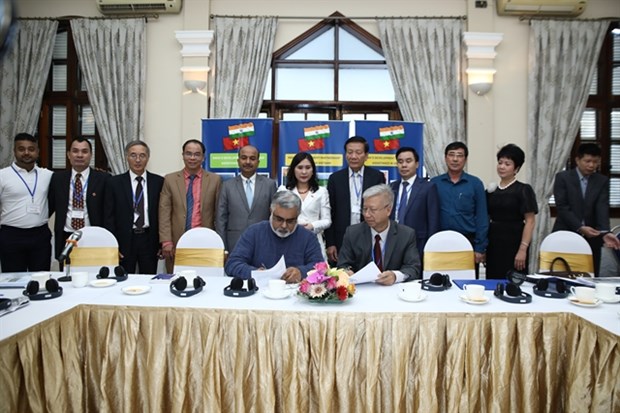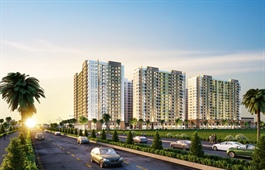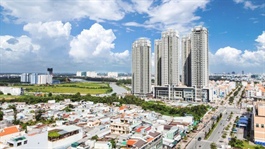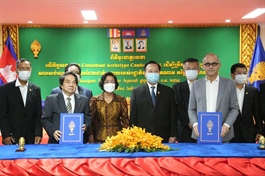Vietnamese, Indian firms to build smart cities in Vietnam
Vietnamese, Indian firms to build smart cities in Vietnam
Vietnamese and Indian enterprises gathered in the capital city of Hanoi on October 8 to discuss ways to develop smart cities in Vietnam.

Vietnamese Global Investment signs the MoU with Indian Spatial Decision Vietnam in an the interactive meeting. (Photo: VNA)
|
Vietnamese and Indian enterprises gathered in the capital city of Hanoi on October 8 to discuss ways to develop smart cities in Vietnam.
Promoting cooperation between Vietnam and India in the field of Information and Communication Technology (ICT), the Embassy of India in coordination with Vietnam’s Association of Foreign Invested Enterprises (VAFIE) organised the interactive meeting to connect businesses.
In recent meetings, the Ministry of Information and Communication (MIC) has continued to define smart cities as the basic driving force for socio-economic development across the country, with more than 830 urban areas with an urbanisation rate of 38.6 percent.
Economic growth in urban areas was between 12 and 15 percent, about double the national average, so the designs of old cities were out of date, said a representative from the Urban Development Agency under the Ministry of Construction.
About 30 cities and provinces nationwide, including HCM City and Hanoi, had implemented smart urban construction projects, meaning the current development of smart cities was still inadequate.
Some localities had started deploying some basic applications and services for smart cities. Meanwhile, ministries and agencies were continuing to research and complete building guidelines, mechanisms and policies for smart cities.
Considering India a good destination for smart solutions and competitive prices, VAFIE’s Vice Chairman Nguyen Anh Tuan said: “The meeting provides chances for Vietnam and local enterprises to find suitable partners and solutions to develop smart cities and smart services.”
According to the Indian Embassy in Hanoi, India launched its flagship programme ‘Digital India’ in 2015 with a vision to transform India into a digitally empowered society and knowledge-based economy. This programme centered on the vision of offering digital infrastructure as a core utility to every citizen, providing governance and services on demand, and enabling the digital empowerment of citizens.
Ambassador Pranay Verma said: “Over the years, IT and ITS have emerged to be a promising area for co-operation between India and Vietnam. Many Indian IT companies have also established their presence in Vietnam to provide IT training, solutions and services, especially in banking, telecoms and cyber security.”
The ambassador told Vietnam News: “While the whole world confronts destruction from the COVID-19 pandemic, information and communication technology has emerged as an effective tool for governance, fintech, education, business, office work and social connections.”
Seeing Vietnam has emerged to be among the key players in ASEAN in the ICT sector, he added: “Some Indian start-ups have established their presence in Vietnam in travel technology and financial technology.”
“Vietnam has high quality ICT human resources and high tech facilities, the combination with India with better experience of smart cities will bring the best benefit for both sides,” said a representative of the Indian Business Chamber in Vietnam.
According to VAFIE, the Vietnamese Government had approved the National Digital Transformation programme to 2025 with an orientation to 2030, aiming to raise the digital economy’s contribution to gross domestic product (GDP) to 20 percent by 2025 and 30 percent by 2030 and bringing Vietnam into the top three digital governments in ASEAN by 2030.
Niranjan Sahoo, chief regional manager of Bharat Electronic Limited, said his firm was an Indian state-owned aerospace and defence company and had extended smart city solutions across India.
Being in Vietnam for two and a half years, the manager told Vietnam News: “Vietnam can not only develop smart cities but also smart villages in all parts of the country.”
Tran Cong Son, Vice Chairman of Tuan Chau Group, said with a series of hospitality facilities in Vietnam, the group sought smart solutions and tourism services to better attract customers, giving them added value for their travels after the pandemic.
Attending the meeting, Son expected their Indian partners to help him build a VR and AR experience on his 1,500ha resort in Tuan Chau Resort in Quang Ninh province, adding that: “There are more places that the group is investing in Vietnam which need smart solutions.”
VAFIE’s Tuan, who also runs a global portal called Global Invest that connects local businesses with others, said VAFIE would work more with both sides to help develop smart cities in Vietnam.

























